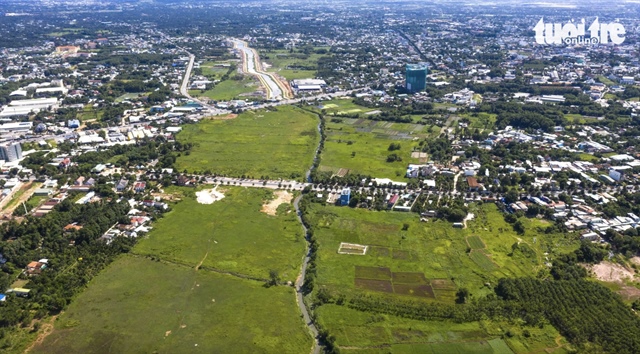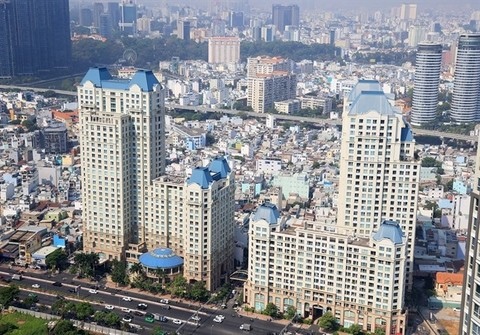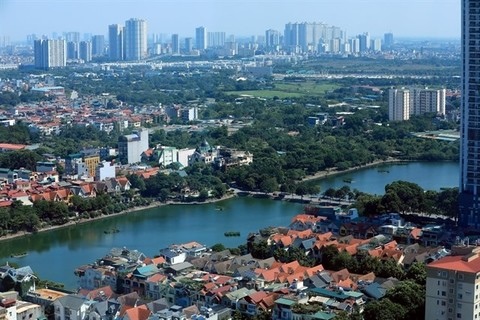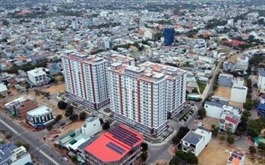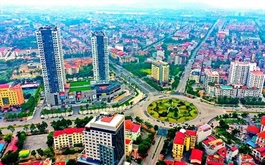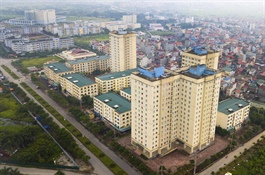Positive real estate signs march ahead
Positive real estate signs march ahead
Credit growth, together with a downward trend of interest rates and the government’s operating policies, are having a positive impact and accelerating the recovery process for the housing market.

March has seen a flurry of activity in welcoming quality real estate products in Vietnam.
Singaporean group CapitaLand Development, saw all of SOHO@Heritage West Lake booked up after being introduced to the market on March 19.
The Elysian project developed by Gamuda Land is also reportedly being well observed by buyers due to the prestige of the developer, the good location, and high quality of the project.
Domestic groups are also joining the rush. Nam Long Investment JSC said that the business is implementing a series of plans in 2023, in which priority is being given to ventures in large urban areas such as Waterpoint, Mizuki Park, Nam Long Can Tho, Nam Long Dai Phuoc, Akari City, and Izumi City.
Meanwhile, Hung Thinh Land introduced the 9X An Suong project in the northwest of Ho Chi Minh City.
In the southern province of Binh Duong, Phu Dong Group is about to open for sale an apartment project in the affordable segment, called Phu Dong Sky One. The project boasts around 830 apartments in Di An City. In addition, some large real estate enterprises have also started to return to the sales race, such as Vingroup with a new subdivision at Vinhomes Grand Park, Rioland with MT Eastmark City apartments located in Ho Chi Minh City, and Van Phuc Group planning to introduce high-end apartment products in Van Phuc city.
The government’s latest actions, effective from March 11, has seemingly gone some way to help improve the outlook. The plan outlined solutions to resolve issues in the real estate market and is expected to address two main obstacles to the market’s growth – legal bottlenecks and cash flow issues.
Regarding cash flow, struggling real estate firms will have the option to extend their principal and interest loans, as well as restructure their debt pools.
Projects that meet the market’s actual needs, are efficient, and have good liquidity – such as social housing, office spaces for lease, renovation of old apartments, and real estate for production, industry, and tourism – will be prioritised for government support.
Moreover, real estate projects with legal compliance, positive sales prospects, and feasible repayment plans will be given easier access to credit.
Bond market breakthrough
Also in March, just a few days after the issuance of a decree on boosting the bond market, real estate businesses immediately successfully issued many bonds, raising over $520 million.
Within a week, three real estate developers alone mobilised the majority of that figure through the bond channel, demonstrating that the market is again enticing.
According to the Hanoi Stock Exchange, on March 16, Phuong Nam Star Urban Development and Business Investment Corporation successfully issued 46,950 bonds, with total issuance value hitting $204 million. This bond lot has a term of 18 months and matures in September 2024.
At the beginning of March, the company also mortgaged 519 individual housing purchase and sale contracts at Dai An Urban Area Project in northern Hung Yen province, mobilising over $290 million.
On March 13, Luxury Living Furniture Trading announced it had issued domestic bonds with a total value of $208 million. The bonds have a term of 60 months, an interest rate of 9 per cent per year, and maturity after five years.
The next day, another real estate developer, the Dream City Villas, successfully issued bonds with a total value of $100 million with an interest rate of 6 per cent per year.
Real estate expert Tran Khanh Quang said that the State Bank of Vietnam’s decision to adjust the credit target will bring positive sentiment to the real estate market.
“With about 1.5-2 per cent of additional credit, the amount of money pumped into the economy is considerable in these difficult times. Therefore, the loosening of credit room and now lowering loan interest rates positively affects businesses in many fields, including real estate,” Quang said.
Dr. Nguyen Van Dinh, chairman of the Vietnam Association for Real Estate Realtors, said that in this quarter of the year, the government will continue to focus on amending and handling problems related to investment procedures with residential projects.
“In particular, when the supply of social and affordable housing is brought to the market by timely incentive policies, transactions will be active again because it will hit the real demand. The improvement in liquidity of this segment will spread heat to the whole market, helping real estate recover,” said Dinh.
Decelerating for sustainability
However, the three factors of inflation, interest rates, and the global recession threats continue to hinder the recovery of key real estate markets across Asia-Pacific.
“Investors are turning to a defensive status, leading to a wave of running away from high-risk assets. Vietnam also cannot avoid the common trajectory. The market with the lowest liquidation in the last three years has shown no sign of stopping,” said David Jackson, general director of Colliers Vietnam.
However, Jackson said each segment recorded a different impact, depicting the trend when the market faced volatility. “The market decelerates and there are still risks, but it also opens up opportunities for sustainable development,” Jackson said.
He confirmed that this is a golden time for real estate reorientation associated with socioeconomic development requirements such as settlement of settlement issues, and real estate for production and business.
“Once the foundations of supply and demand, prices, interest rates, and policies are consolidated, the real estate market will create momentum for stable long-term growth and increased resistance to external shocks,” he added.
Specifically, high-quality assets with sustainable value such as offices, industrial, logistics, and multi-family housing in the Asia-Pacific region will lead growth prospects in 2023. Correspondingly, the property types belonging to the three segments are also expected to have clear movement in Vietnam over the next few years.
As a highly valued defensive asset, industrial real estate such as factories, warehouses, and logistics is forecast to be the most active in the Vietnamese market this year.
The office for lease segment also recorded that tenants have increasingly serious requirements, showing a change in personnel and workplace organisation strategies in recent times.
Although the traditional office model still prevails in Vietnam, the trend of flexible working is becoming more widely accepted. This poses a requirement to rebuild the workspace in a sustainable and flexible manner while ensuring internal cohesion.
Elsewhere, the retail real estate market in Vietnam is seeing major brands continue their expansion plans. AEON Mall Vietnam in February commenced construction of AEON Hue and also received planning approval for AEON Hoang Mai in Hanoi at the same time.
Meanwhile, Central Retail announced an investment of $800 million in which 25-30 per cent will be for expansion in Vietnam this year, with 5-7 malls to be opened into 2024.
In the condominium and town houses segment, the three dynamics of supply, selling prices, and liquidity will continue to face challenges this year, Jackson of Colliers said. Market sentiment will shift towards transparency, with the mid-range segment at reasonable prices more favoured.
As cities expand, the market in new urban areas and residential areas near industrial zones will be more active. Worker housing and social housing could start to gain more attention from developers, thus easing the housing needs for low- to middle-income people.
From an investment perspective, Jackson believes that the residential market remains enticing to foreign capitals.
“Considering the capital and credit constraints in Vietnam, now is a good time for pension funds or insurance capital and other sovereign wealth funds from Europe, North America, and Asia-Pacific to accelerate their presence in residential projects in Vietnam, where domestic developers play the dominant role,” Jackson said.


